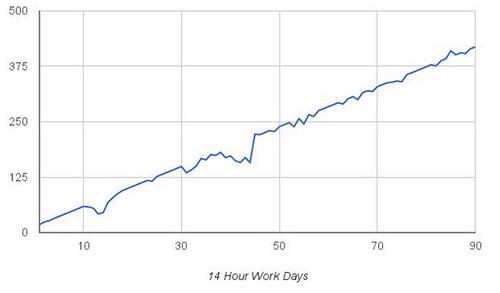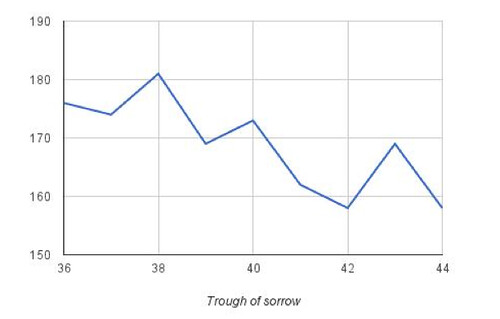
How to Survive the Entrepreneurial Roller Coaster

 It’s 10:36pm and you finally got a few minutes to spend with your significant other, after a 14-hour day day of hustling up business for your startup.
It’s 10:36pm and you finally got a few minutes to spend with your significant other, after a 14-hour day day of hustling up business for your startup.
You’re going to relax and watch the next episode of House of Cards. Maybe some of Mr. Underwood’s negotiating skills and charisma will rub off on you. You sure could use it for the meeting you have the next afternoon with a couple of investors.
Your better half goes to grab a drink in the other room. The temptation is too great. You’re just going to check your email quick. You know… just in case.
From: James Customer
Subject: Taking a different direction
Message:Unfortunately, your solution just isn’t the right fit for our needs at this time. I really appreciate the personal service, but it just doesn’t meet our requirements in a few key areas.
I’m going to need to cancel my account and request a refund.
What?! Are they serious? “I probably spent hours helping them get set up, and this is what they do to me?” you think to yourself. But you can barely hear your inner voice. Frustration fills your head to the point where you think it might explode, and all your senses fade into the background.
“Why am I even doing this anymore?” you say out loud as you slam your laptop closed. Seriously, what’s the use? As if anyone is going to invest. Who are you kidding, anyways.
The night is ruined. You just want to go to bed. Instead, you lie there, fending off self-defeating thoughts as the minutes and hours tick away, and your chance to get some much needed rest floats off with your hopes and dreams.
A NEW DAY
You’re tired, but at least you have your morning routine. Last night’s disappointment still stings, but it seems less painful now that the sun is shining outside.
The smell from the freshly Aeropressed coffee in your favorite mug gets the pleasure centers in your brain firing on all cylinders. You’re gradually feeling better.
You notice your phone has a Twitter mention notification. After tapping a couple times, you get to it:
Just tried BigDatafy & it’s awesome. Whoever built this totally read my mind. Thank you! GO TRY IT! #moneywellspent
You’re shocked. You check the person out, and it’s not your Mom, or any of your friends, as far as you can tell.
Sure enough, it’s a real customer, after checking your email for a payment notification. But… there’s three more notifications just like it. “Oh no, my code that creates the Stripe subscription is acting up again,” you think. But it’s not. They are all unique, and very real customers.
Great success. Today is going to rock.
WHAT’S IT ALL MEAN?
If you’re an entrepreneur, you’ve probably experienced similar lows and highs many times. Many… many times. Maybe even a few cycles within the same day. I know that I have through my work at LemonStand.
But why? There’s a few reasons.
1. You’re bad at seeing randomness for what it is.
The brain is hardwired to detect patterns. So much so that you will see patterns, or trends, where there are none. 1 or 3 events are not statistically significant. It’s not enough evidence to draw any conclusions on.
That one customer that canceled? Random. Those 3 people who signed up? Probably random.
This doesn’t mean that you shouldn’t try to glean insight from these events. By all means, call up Mr. Customer and find out why they signed up, or churned. Just make sure you do it once you’ve calmed down a little.
But just know that 1 person’s comments are not very meaningful in the big picture. Depending on your market, 20 people’s comments might not be particularly significant. Or, if your audience is really big, the same could even be true for 200.
Here’s a more visual example:

Great looking chart. It has some dips here and there, but nothing to worry about. The overall trend is strong, and there’s enough data to draw some conclusions.
But… what’s that little blip in between the 30 and 50 on the horizontal axis?
This represents one particular week. The 7 day report is up on your dashboard.

Oh no! Things are going downhill fast. It’s all over. Better start looking for a day job to pay your rent, because things are imploding. Sound familiar?
Good long-term investors know to not watch their stocks daily. The human mind doesn’t cope very well with that sort of roller coaster ride when you’re zoomed into a small time period or sample size.
Key takeaway: The human brain is obsessed with finding patterns, and it’ll invent them up if it has to. Try to take a bigger picture view. If you haven’t been at it long enough to have a trend then just focus on the process and continuous incremental improvements until you have more data.
2. You care too much.
Most likely, you started on your entrepreneurial journey because you had a deep passion for solving a particular problem.
Your mission means something to you. You’ve put in blood, sweat and tears. You’ve neglected other areas of your life to pursue your dream. Sometimes, it feels like you are the company. You couldn’t imagine not being that person.
This sort of passion can make things feel very personal at times. Every negative comment hurts, and every small win feels like you spun the wheel on The Price Is Right and landed on 100.
But make no mistake, you need that passion. Without it, you will give up too early. You will burn out and forget why you started in the first place. Keep the fire burning inside you, but don’t let it consume you either.
Key takeaway: One negative comment really doesn’t matter in the big picture. Take a longer view and be more objective. See if there’s a trend, or if you’re just upset because someone attacked your baby. Capture as much information as possible about events, but at the same time, don’t let the detractors get to you. Haters gonna hate.
3. You lack perspective.
Your startup has completely consumed every aspect of your life, so much so that you feel intense emotions along the way as if it’s the only thing you have.
You now personally identify with being the founder of your startup, or an entrepreneur in general, and it could seem like there is little difference between failure and death.
But, it’s not the only thing you have. No matter what your situation, you’re alive. You’re above ground and breathing the air. You’re obviously brave and passionate enough to start something. It’s likely that you’re intelligent and persistent.
Know that you are more than just your startup. Get a hobby, preferably one that helps you clear your mind. Work on your health and personal relationships.
These things will help you be more balanced, and therefore make better decisions and give you more data to work from.
Key takeaway: If your startup is all you have, every blow is hugely magnified, which leads to emotional overreaction. Develop a thicker skin by widening out as a person with your interests and relationships. This broader perspective will help you be a better entrepreneur.
Onward and upward
So, next time you get hit with a bit of rejection or disappointment, take the long view, and don’t get caught up in a single isolated event.
Be grateful for the small wins, and celebrate them. Especially savor them in the early days because, eventually, acquiring 100 new customers feels the same as 10 or even 1. Everything normalizes, no matter what scale it’s at. After you’ve celebrated, get back to it and keep moving forward!
There are no silver bullets, so stop looking for one. Focus on continuous incremental improvements instead of telling yourself that “If only I did X I would be successful and happy.” Get fired up about the process of whatever it is that you do, and the results will come.











